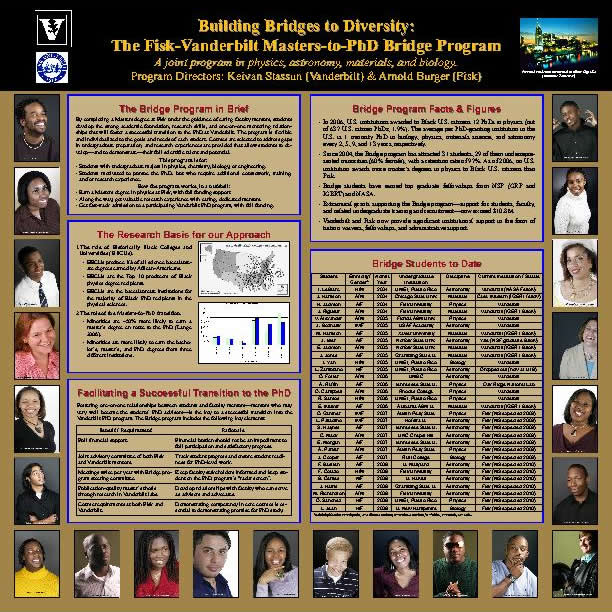Education and Diversity in Astronomy and Astrophysics
 The centerpiece of VIDA's educational efforts is the Fisk-Vanderbilt Masters-to-PhD Bridge Program. The aim of the Bridge program is to give students with undergraduate science or engineering degrees the preparation needed to earn a PhD in astronomy, physics, materials science, or biology. By completing a MS degree under the guidance of caring faculty mentors, students develop the strong academic foundation, research skills, and one-on-one mentoring relationships that will foster a successful transition to the PhD. The program is flexible and individualized to the goals and needs of each student. Courses are selected to address gaps in undergraduate preparation, and research experiences are provided that allow students to develop—and to demonstrate—their full scientific talent and potential. Since 2004, the program has attracted 80 students, 90% of them underrepresented minorities (50% female), with a retention rate to the PhD of over 80%. Vanderbilt has achieved the distinction of becoming the top research university to award PhDs to minorities in astronomy, materials science, and physics, and Fisk has become the top producer of Black U.S. recipients of the MS degree in physics. A poster summarizing the program and its participants is available here.
The centerpiece of VIDA's educational efforts is the Fisk-Vanderbilt Masters-to-PhD Bridge Program. The aim of the Bridge program is to give students with undergraduate science or engineering degrees the preparation needed to earn a PhD in astronomy, physics, materials science, or biology. By completing a MS degree under the guidance of caring faculty mentors, students develop the strong academic foundation, research skills, and one-on-one mentoring relationships that will foster a successful transition to the PhD. The program is flexible and individualized to the goals and needs of each student. Courses are selected to address gaps in undergraduate preparation, and research experiences are provided that allow students to develop—and to demonstrate—their full scientific talent and potential. Since 2004, the program has attracted 80 students, 90% of them underrepresented minorities (50% female), with a retention rate to the PhD of over 80%. Vanderbilt has achieved the distinction of becoming the top research university to award PhDs to minorities in astronomy, materials science, and physics, and Fisk has become the top producer of Black U.S. recipients of the MS degree in physics. A poster summarizing the program and its participants is available here.
Bridge Program Facts & Figures
- In 2006, U.S. institutions awarded to Black U.S. citizens just 12 PhDs in physics (out of 637 U.S. citizen PhDs; 1.9%) [data from NSF WebCASPAR]. The average per PhD-granting institution in the U.S. is 1 minority PhD in biology, physics, materials science, and astronomy every 2, 5, 9, and 13 years, respectively.
- The Fisk-Vanderbilt Bridge program is on track to award more than 10 times the U.S. institutional average number of minority PhD recipients in astronomy, physics, materials science, and biology. Our most recent cohort alone includes more minority students in astronomy than the current annual production for the entire U.S.
- As of 2006, no U.S. institution awards more MS degrees in physics to Black U.S. citizens than Fisk, and Fisk has become one of the top 10 producers of physics MS degrees to all U.S. citizens. In 2010 Fisk became the #1 ranked liberal-arts HBCU in research [Washington Monthly rankings].
- In 2009, five years after the Bridge Program's inception, the program graduated its first PhD.
- Our Bridge students have been awarded the nation’s top graduate fellowships from NSF (GRF and IGERT) and NASA.
- Extramural grants received to support the Bridge program—support for students, faculty, and related undergraduate training and recruitment—now exceed $25M.
- Vanderbilt and Fisk now provide significant institutional support in the form of tuition waivers, RA stipends, and administrative support.
The Vanderbilt—Cape Town Partnership
A primary goal of the Vanderbilt-Cape Town partnership is to recruit and train more astronomers, physicists, and materials scientists in South Africa and US, particularly students from underrepresented backgrounds. Like African Americans and other underrepresented groups in the United States, black Africans are underrepresented in the physical sciences. Under the agreement between recently signed by former Vanderbilt Chancellor Gordon Gee and UCT Vice Chancellor Njabulo S. Ndebele, Vanderbilt and UCT are core partners in research and education initiatives benefiting students, faculty and staff at both universities. Both universities are making plans for this new partnership to extend beyond the typical student exchange programs to include opportunities for collaborative research and study across several academic disciplines. Already, the VIDA exoplanet project is in the process of developing an automated telescope in partnership with the South African Astronomical Observatory.
The Vanderbilt—Queen's University Partnership
VIDA researchers are collaborating with the exoplanets and astronomical transients groups at Queen's University Belfast (QUB). These collaborations are supported by VIDA funds, which supports access to LSST and SDSS-III, as well as dedicated support from QUB in the form of two PhD studentships that are co-mentored by QUB and Vanderbilt faculty and postdocs.
